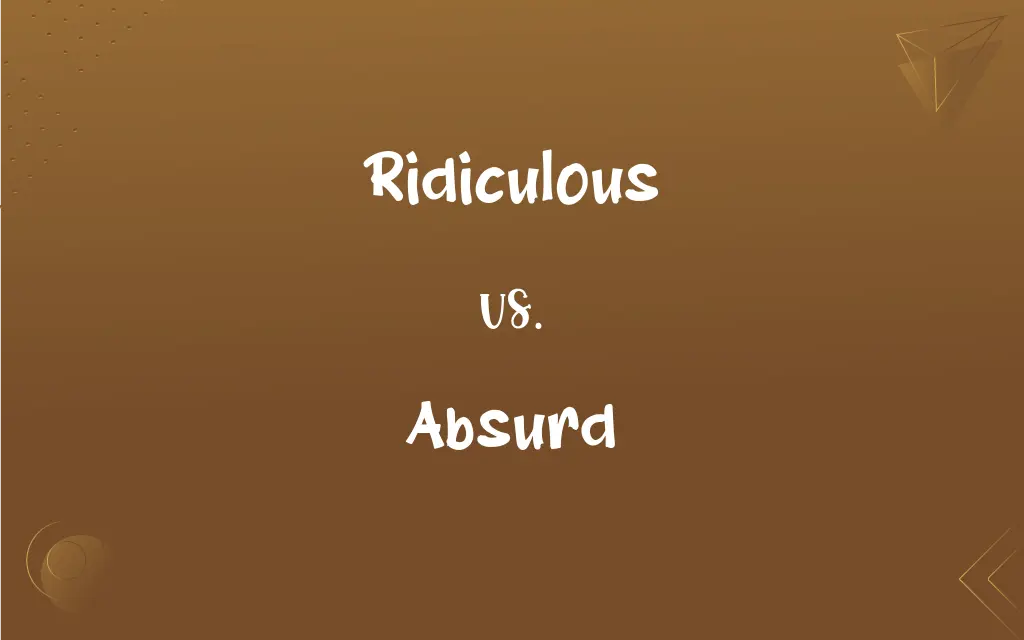Ridiculous vs. Absurd: What's the Difference?
Edited by Aimie Carlson || By Janet White || Updated on November 13, 2023
Ridiculous refers to something that is laughably or ludicrously unreasonable, while absurd describes something that is nonsensical, illogical, or completely out of harmony with rational thought.

Key Differences
Ridiculous implies an extreme lack of wisdom or good sense, often provoking laughter or scorn. Absurd, however, delves into the realm of the irrational, emphasizing a departure from logic and reason.
Something ridiculous can be seen as comically or mockingly unreasonable, like a ridiculous outfit. In contrast, the absurd often relates to the philosophically or existentially irrational, like an absurd existential dilemma.
Ridiculousness often has a lighter, more humorous connotation. The absurd carries a weightier implication, suggesting a deep-seated illogicality in a situation or idea.
The ridiculous may involve situations or actions that are highly exaggerated or embellished. Absurdity often implies a sense of the bizarre or the fundamentally unreasonable that defies common sense.
In common usage, ridiculous is used more in everyday language to describe things that are outrageously silly. Absurd, while also used in general speech, is often linked to a philosophical context.
ADVERTISEMENT
Comparison Chart
Tone
Often humorous, mocking
More serious, philosophical
Connotation
Laughably unreasonable
Deeply illogical or nonsensical
Usage
Common in everyday language
Used in both everyday and philosophical contexts
Implication
Exaggeration, lack of sense
Defiance of logic, irrationality
Context
Situations, actions, appearances
Situations, ideas, existential themes
ADVERTISEMENT
Ridiculous and Absurd Definitions
Ridiculous
Laughably unreasonable or nonsensical.
Wearing a swimsuit in a snowstorm is ridiculous.
Absurd
Inconsistent with reason or logic.
Her conclusion was absurd, with no basis in fact.
Ridiculous
Deserving or inviting mockery or derision.
His claim to have invented the internet was ridiculous.
Absurd
Completely illogical or unreasonable.
The theory he proposed was absolutely absurd.
Ridiculous
Outrageously silly or inappropriate.
The idea of a fish riding a bicycle is ridiculous.
Absurd
Bizarre or strangely unreasonable.
The absurdity of the situation was almost comical.
Ridiculous
Demonstrating a lack of common sense.
It's ridiculous to expect toddlers to understand complex math.
Absurd
Philosophically meaningless or nonsensical.
The play delved into the absurd nature of existence.
Ridiculous
Absurdly exaggerated or overdone.
The character's ridiculous costume made everyone laugh.
Absurd
Wildly inappropriate or unrealistic.
Suggesting a penguin could live in the desert is absurd.
Ridiculous
Deserving or inspiring ridicule; absurd, preposterous, or silly.
Absurd
Extremely unreasonable, incongruous, or inappropriate
An absurd request.
Ridiculous
Deserving of ridicule; foolish, absurd
That hairstyle looks ridiculous.
It's ridiculous to charge so much for a little souvenir.
You make ridiculous statements a lot, like saying that UFOs are real.
Absurd
Impossible to take seriously; silly
A character who goes through many absurd adventures.
Ridiculous
(informal) astonishing, extreme, unbelievable
In a ridiculous feat of engineering, the team can calculate the difference in arrival time to within one-tenth of a nanosecond.
Gaines is a classic motor player with a low center of gravity and ridiculous strength.
Absurd
Of, relating to, or manifesting the view that there is no order or meaning in human life or in the universe.
FAQs
Does absurdity have a philosophical context?
Yes, it's often associated with existential or philosophical illogicality.
Can a situation be both ridiculous and absurd?
Yes, if it's both laughably nonsensical and illogically unreasonable.
Is ridiculous a negative term?
It can be, especially when it implies foolishness or mockery.
Can art be absurd?
Yes, especially when it challenges logical conventions or reality.
Can a belief be ridiculous?
Yes, if it's seen as extremely foolish or unreasonable.
What makes something ridiculous?
It's ridiculous when it's laughably unreasonable or nonsensical.
Is ridiculousness always funny?
Often, but it can also be mockingly or scornfully unreasonable.
Can a decision be both absurd and ridiculous?
Yes, if it's both illogically unreasonable and laughably nonsensical.
How is absurd different from ridiculous?
Absurd refers to what's completely illogical or outside rational thought.
Do people use 'absurd' in casual talk?
Yes, though it's often used to describe things that defy common sense.
Does 'absurd' imply something is wrong?
Not necessarily wrong, but fundamentally illogical or nonsensical.
Can a scientific theory be ridiculous?
Yes, if it defies basic common sense or established knowledge.
Is 'ridiculous' used in formal writing?
It can be, though its use depends on the tone and context.
What kind of humor is found in the absurd?
Often, it's a humor that arises from bizarre or illogical situations.
Is absurdity always intentional?
Not always; sometimes it naturally arises from a situation's illogical nature.
What's an example of an absurd idea?
An example is the suggestion that time can flow backwards.
Is it common to use 'ridiculous' in daily conversation?
Yes, it's frequently used to describe outrageously silly or nonsensical things.
Do philosophers discuss the absurd?
Yes, particularly in existential and absurdist philosophy.
Can a plan be labeled as ridiculous?
Yes, if it's seen as highly unreasonable or impractical.
Can technology be ridiculous?
Yes, especially when it's overly complex for a simple task.
About Author
Written by
Janet WhiteJanet White has been an esteemed writer and blogger for Difference Wiki. Holding a Master's degree in Science and Medical Journalism from the prestigious Boston University, she has consistently demonstrated her expertise and passion for her field. When she's not immersed in her work, Janet relishes her time exercising, delving into a good book, and cherishing moments with friends and family.
Edited by
Aimie CarlsonAimie Carlson, holding a master's degree in English literature, is a fervent English language enthusiast. She lends her writing talents to Difference Wiki, a prominent website that specializes in comparisons, offering readers insightful analyses that both captivate and inform.































































